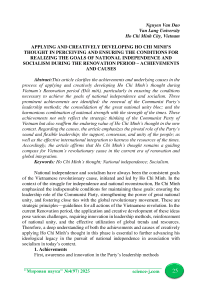Applying and creatively developing Ho Chi Minh’s thought in perceiving and ensuring the conditions for realizing the goals of national independence and socialism during the renovation period – achievements and causes
Автор: Nguyen V.D.
Журнал: Мировая наука @science-j
Рубрика: Основной раздел
Статья в выпуске: 4 (97), 2025 года.
Бесплатный доступ
This article clarifies the achievements and underlying causes in the process of applying and creatively developing Ho Chi Minh’s thought during Vietnam’s Renovation period (Đổi mới), particularly in ensuring the conditions necessary to achieve the goals of national independence and socialism. Three prominent achievements are identified: the renewal of the Communist Party’s leadership methods; the consolidation of the great national unity bloc; and the harmonious combination of national strength with the strength of the times. These achievements not only reflect the strategic thinking of the Communist Party of Vietnam but also reaffirm the enduring value of Ho Chi Minh’s thought in the new context. Regarding the causes, the article emphasizes the pivotal role of the Party’s sound and flexible leadership; the support, consensus, and unity of the people; as well as the effective international integration to harness the resources of the times. Accordingly, the article affirms that Ho Chi Minh’s thought remains a guiding compass for Vietnam’s revolutionary cause in the current era of renovation and global integration.
Ho chi minh’s thought, national independence, socialism
Короткий адрес: https://sciup.org/140311476
IDR: 140311476
Текст научной статьи Applying and creatively developing Ho Chi Minh’s thought in perceiving and ensuring the conditions for realizing the goals of national independence and socialism during the renovation period – achievements and causes
National independence and socialism have always been the consistent goals of the Vietnamese revolutionary cause, initiated and led by Ho Chi Minh. In the context of the struggle for independence and national reconstruction, Ho Chi Minh emphasized the indispensable conditions for maintaining these goals: ensuring the leadership role of the Communist Party, strengthening the power of great national unity, and fostering close ties with the global revolutionary movement. These are strategic principles—guidelines for all actions of the Vietnamese revolution. In the current Renovation period, the application and creative development of these ideas pose various challenges, requiring innovation in leadership methods, reinforcement of national unity, and the effective utilization of global trends and resources. Therefore, a deep understanding of both the achievements and causes of creatively applying Ho Chi Minh’s thought in this phase is essential to further advancing his ideological legacy in the pursuit of national independence in association with socialism in today’s context.
-
1. Achievements
First, awareness and innovation in the Party’s leadership methods
In the process of national renovation, the Communist Party of Vietnam has clearly recognized that, in order to maintain its leading role, it must fundamentally and comprehensively reform its leadership methods to meet the requirements of a socialist-oriented market economy and the deepening process of international integration. This is not only an inevitable demand but also a creative and flexible application of Ho Chi Minh’s thought on the Party’s leadership role in a new context—one in which the country is undergoing strong transformations in politics, economy, society, and development mindset.
Ho Chi Minh emphasized that the Communist Party of Vietnam is “a ruling Party”27, meaning it must be the sole leading force, possessing the necessary morality, intelligence, and courage to direct and guide the revolution forward. However, he also consistently stressed the need for the Party to renew and rectify itself to be worthy of this role. In response to historical imperatives, since the 6th National Congress (1986), the Party adopted the policy of comprehensive renovation, beginning with a shift in economic thinking—from a centrally planned economy to a socialist-oriented market economy with state regulation. Accordingly, administrative and command-based leadership was replaced with leadership through resolutions and strategic orientation, enabling grassroots levels to be more dynamic and creative.
Alongside this, the Party has always upheld the principle of “relying on the people,” respecting and promoting the people’s right to mastery—a core idea throughout Ho Chi Minh’s ideological legacy. Expanding democracy within the Party and society, facilitating public participation in supervision and feedback, while encouraging grassroots-level innovation, are all vivid expressions of the Party’s openness to renewal and integration. These efforts have laid a solid foundation for the Party’s effective leadership in the new era and have maintained the people’s trust.
A testament to the Party’s steadfastness in reforming its leadership methods is reflected in recent key resolutions, notably Resolution No. 28-NQ/TW (2022) from the 6th Plenum of the 13th Central Committee28. This resolution once again reaffirmed the urgent need to innovate the Party’s ruling methods and to build a cleaner, stronger Party. All these efforts illustrate the Party’s consistent and flexible development in inheriting and applying Ho Chi Minh’s thought to meet the increasingly complex demands of reality and the times.
Second, raising awareness and strengthening the great national unity bloc
Ho Chi Minh’s thought has always regarded great national unity as the invincible strength of the Vietnamese revolution. He asserted that without unity, there can be no success; unity is a long-term strategy, not merely a tactical measure.

Deeply imbued with this thought, during the renewal period, the Communist Party of Vietnam identified great national unity as one of the key and consistent tasks throughout the process of national development.
Since the 6th National Congress (1986), amid economic and social crises and growing uncertainty among the people, the Party emphasized the need to promote the people’s right to mastery and to place them at the center of all policies. This marked the beginning of institutionalizing Ho Chi Minh’s thought on national unity. To realize this, the Party implemented a series of targeted programs focusing on remote and disadvantaged areas, policies on ethnicity and religion, poverty reduction, and the protection of vulnerable groups.
Especially at the 7th National Congress, the Party officially identified the alliance of workers, peasants, and intellectuals as the solid political foundation of the great national unity bloc. This perspective not only reflects the Party’s dialectical thinking and strategic vision but also represents a continuation of Ho Chi Minh’s ideology in a modern context. The Party extended this unity beyond the domestic population to include the overseas Vietnamese community, considering them an inseparable part of the nation, jointly contributing to national construction and defense29.
In this process, the role of the Vietnam Fatherland Front and other politicalsocial organizations has become increasingly affirmed. These bodies serve as essential channels for the people to express their aspirations, convey their concerns, and participate in the policy-making process. Dialogue, listening, and resolving grassroots issues have helped strengthen the trust between the Party and the people—a clear testament to the creative and flexible application of Ho Chi Minh’s thought on great national unity in the new era.
Third, raising awareness and combining national strength with the strength of the times
Ho Chi Minh’s ideology on the combination of national strength and the strength of the times is a significant theoretical and practical contribution to the movement for national liberation and national development. He consistently asserted that the Vietnamese revolution must rely on the internal strength of the people while simultaneously seeking support from international friends and taking advantage of the opportunities of the era. The Communist Party of Vietnam has flexibly applied this thought during the renovation period, especially since the 6th National Congress.
From that congress onward, the Party clearly understood that to successfully transition from a centrally planned economy to a socialist-oriented market economy, the nation’s internal strength must be effectively combined with external factors. Ho Chi Minh emphasized, “Internal strength is crucial,” and “the revolution is the cause of the masses,” yet he was also keenly aware that revolutionary success could not be separated from international solidarity. In line with this, the Party adopted a flexible foreign policy, creatively applying Ho Chi Minh’s idea of “adding friends, reducing enemies” from the national liberation period. The Party shifted its stance from “willing to be friends with all countries”30 at the 7th Congress, to “willing to be a friend and trustworthy partner”31 at the 9th Congress, and further to the commitment of being “a responsible member of the international community”32 at the 11th Congress. This policy not only consolidated national strength but also elevated Vietnam’s international stature, transforming the country from one isolated by embargoes into a reliable partner and responsible member of the global community.
Particularly at the 11th Congress, the Party demonstrated an evolved perspective by shifting from “proactive and active international economic integration” to “proactive and active international integration”33 across all fields. This strategic shift helped open Vietnam’s doors wider to the world and leverage global resources for development. Clear outcomes include Vietnam’s participation in new-generation free trade agreements such as CPTPP, EVFTA, and RCEP, which have expanded export markets, attracted foreign investment, promoted industrialization and modernization, enhanced labor quality, and improved the business environment. These achievements are vivid evidence of the creative application of Ho Chi Minh’s thought, as the Party has simultaneously safeguarded independence and sovereignty while leveraging globalization to drive socioeconomic development.
Resolution No. 22-NQ/TW (2013) of the Politburo marked a turning point in the recognition and implementation of the ideology of combining national and global strengths. It reaffirmed that economic integration is the central focus, while also requiring that “integration in other fields must facilitate economic integration and positively contribute to economic development”34. Thanks to this approach, Vietnam has effectively integrated with the world while preserving national sovereignty and the socialist orientation—an eloquent demonstration of the creative application of Ho Chi Minh’s thought during the period of comprehensive renovation and deep international integration.
-
30 Communist Party of Vietnam (1991), Documents of the 7th National Party Congress , Truth Publishing House, Hanoi, p. 147.
-
31 Communist Party of Vietnam (2001), Documents of the 9th National Party Congress , National Political Publishing House, Hanoi, p. 119.
-
32 Communist Party of Vietnam (2016), Documents of the 12th National Party Congress , Office of the Party Central Committee, Hanoi, p. 153.
-
33 Communist Party of Vietnam (2016), Documents of the Party Congresses during the Renovation Period – Part II: 10th, 11th, and 12th Congresses , National Political Publishing House, Hanoi, p. 435.
-
34 Politburo (2013), Resolution No. 22-NQ/TW dated April 10, 2013, On international integration , Communist Party of Vietnam Online Newspaper. Retrieved from https://tulieuvankien.dangcongsan.vn/he-thong-van-ban/van-ban-cua-dang/nghi-quyet-so-22-nqtw-ngay-1042013-cua-bo-chinh-tri-ve-hoi-nhap-quoc-te-264 .

-
2. Underlying Causes
First, the sound leadership of the Party
One of the fundamental and decisive factors behind Vietnam’s significant and historically meaningful achievements in the renewal (Đổi mới) process is the sound, visionary, and flexible leadership of the Communist Party of Vietnam. This leadership has been demonstrated not only in formulating correct guidelines and policies but also in its ability to adjust leadership methods in response to the rapidly and increasingly complex domestic and international contexts.
As early as the 1980s, when Vietnam was facing a severe economic and social crisis, the Party had the courage to confront reality, acknowledge the limitations of the centrally planned economy, and subsequently introduce groundbreaking reforms at the 6th National Congress (1986), marking the beginning of the comprehensive renewal process. This moment was a clear manifestation of the Party’s political mettle, independent thinking, creativity, and its profound engagement with practical realities.
Moreover, the Party’s leadership has always focused on internal consolidation and rectification. At various critical junctures, the Party issued pivotal resolutions, such as the 4th Plenum of the Central Committee (11th, 12th, and 13th terms), aimed at combating ideological, ethical, and lifestyle degradation, as well as signs of “self-evolution” and “self-transformation” within the Party. Through such actions, the Party has consistently renewed and reinforced itself to maintain its role as the political nucleus in all circumstances.
A particularly notable aspect of the Party’s leadership during the renewal period is its “listen – absorb – adjust” mechanism. The Party does not place itself above the people, but rather affirms that “the Party’s will and the people’s hearts” must align for success. Major policy decisions are always based on practical surveys and widespread public consultation, ensuring a high level of societal consensus. This approach has helped reinforce public trust while activating a sense of responsibility, proactiveness, and creativity at the grassroots level—elements that President Ho Chi Minh profoundly emphasized when he said: “Easy things become impossible without the people; impossible things become easy with the people.”
Furthermore, the Party has demonstrated strategic acumen in adjusting national development strategies in accordance with changing times. From renewing economic thinking, opening up to international integration, building a socialist-oriented market economy, to enhancing national competitiveness and comprehensive global integration, the Party has shown remarkable strategic vision and scientifically sound governance.
This sound leadership has ensured political and social stability, built strong public confidence, and mobilized the collective strength of the political system and the entire people. It is the foundational factor that has enabled Vietnam to overcome crises, develop its economy and society sustainably, successfully integrate internationally, and increasingly affirm its stature in the global arena.
Second, national unity and the support of the people

The solidarity and close bond between the Party and the people is a solid foundation and an immense internal driving force behind the success of all national policies, strategies, and development plans. Fully aware of this, the Communist Party of Vietnam has always regarded the strengthening and promotion of great national unity as not merely a routine political task, but as a vital and strategic mission throughout its leadership of the revolution and national development.
Ho Chi Minh’s thought on great national unity has been creatively applied by the Party as the basis for fostering a deep-rooted bond between the Party and the people—a bond built and nurtured on mutual respect, understanding, and the promotion of the people’s right to mastery.
Beyond national borders, the Party has extended the concept of national unity to the overseas Vietnamese community, recognizing them as an inseparable part of the great national unity bloc. This vision has been translated into concrete policies aimed at inclusive development, with particular attention to vulnerable groups such as ethnic minorities, residents of remote areas, and the disadvantaged. Programs on poverty reduction and socioeconomic development in difficult regions have not only delivered material benefits but also enhanced social consensus, reinforced trust, and strengthened the people’s attachment to the Party and the socialist regime.
National unity is not the result of imposition, but the outcome of a persistent and patient process of building mutual understanding and cooperation between the Party and the people. The Party has continuously expanded democracy, enabling citizens to participate in policymaking, implementation, and oversight. Promoting the people’s role as masters has become a crucial foundation that has allowed the Party’s renewal policies to quickly take root and yield concrete results, while also creating a stable and development-oriented society.
A vivid example of the Party’s consistent commitment to strengthening national unity is the 8th Plenum of the 13th Central Committee, which reviewed 20 years of implementing Resolution No. 23-NQ/TW (2003) on promoting the strength of great national unity. Based on this review, Resolution No. 43-NQ/TW, dated November 24, 2023, was issued, reaffirming the central role of the alliance of workers, farmers, and intellectuals under the Party’s leadership, as well as the strong bonds among ethnic groups, religions, Vietnamese at home and abroad, and international friends who cherish peace. The resolution sets forth the goal of building a strong, prosperous, high-income country by 2045—clearly expressing the Party’s consistent view that great national unity is vital for ensuring political and social stability, and for the success of Vietnam’s renewal, integration, and development in the new era.
Third, effectively combining national strength with the strength of the times
In the context of deep renovation and comprehensive international integration, the harmonious combination of national strength with the strength of the times has become a fundamental factor contributing to major achievements in the application and creative development of Ho Chi Minh’s thought. More than a strategic orientation, this combination is a prerequisite condition that enables
Vietnam to progressively realize the goal of national independence associated with socialism—the enduring ideal of the Vietnamese revolutionary path.
First and foremost, it must be affirmed that national strength is the core internal force and foundational basis for all historical and contemporary victories of the country. This strength is crystallized from enduring traditional values such as patriotism, solidarity, resilience, perseverance, and the aspiration for national development—all fostered under the leadership of the Communist Party of Vietnam. However, in today's era—where nations are increasingly interdependent—this endogenous strength must be reinforced by the strength of the times. This includes the fruits of scientific and technological advances, global trends of peace, cooperation and development, as well as the increasingly favorable international environment. The Party’s ability to grasp and harmoniously integrate these two factors—national and international—has been a key driver of both theoretical and practical breakthroughs in the renewal process, helping secure the realization of socialism based on national independence.
Throughout the renovation journey, the Communist Party of Vietnam has demonstrated strategic sensitivity by adopting a proactive approach to international integration and effectively mobilizing external resources to serve domestic development. Participation in international organizations, the signing of numerous next-generation free trade agreements, and the promotion of comprehensive, indepth, and multilateral foreign relations have created unprecedented opportunities for Vietnam to integrate deeply into the global development flow. At the same time, the Party continues to emphasize the importance of internal strength—awakening national aspirations, promoting people’s ownership, and maximizing internal resources for sustainable development.
The tangible results of effectively combining national strength and the strength of the times are clearly reflected in Vietnam’s rising international status. From a poor and underdeveloped country once isolated by embargoes, Vietnam has transformed into a dynamic economy with high openness, playing an increasingly active role in regional and global forums. These achievements are not only the result of skillful foreign policy but also vivid proof of the creative application of Ho Chi Minh’s thought—always harmonizing traditional values with progressive elements of the times.
At the 13th National Party Congress, the Communist Party of Vietnam reaffirmed that igniting the spirit of self-reliance, self-confidence, and the aspiration for a prosperous and happy nation is a crucial driving force for the renewal cause. In that context, the combination of national strength—including willpower, aspiration, and internal resources—with the strength of the times—global trends and external resources—is considered a cornerstone of the country’s development strategy. This is not only a theoretical viewpoint but a vivid reality, as Vietnam maintains national independence and sovereignty while taking advantage of integration to advance rapidly on the path of industrialization, modernization, and global engagement.
Conclusion
Throughout the renovation process, the Communist Party of Vietnam has successfully applied and creatively developed Ho Chi Minh’s thought, thereby achieving significant accomplishments in ensuring the conditions for the realization of national independence and socialism. These achievements are rooted in the sound and visionary leadership of the Party, the powerful unity of the people, and the effective integration of national strength with the strength of the times in the context of globalization. The Party has continually innovated its leadership methods, adapted to practical realities, and introduced appropriate guidelines and strategies that have fostered the country’s sustainable development.
National solidarity, strengthened through the construction of a robust great unity bloc, has served as a vital driving force for development. Meanwhile, proactive international integration and the leveraging of global support and knowledge have helped Vietnam not only enhance its international standing but also create favorable conditions for socioeconomic development. In summary, the achievements of the renewal process are the result of a harmonious combination of Ho Chi Minh’s thought and the creative, correct leadership of the Party, contributing to the building of an independent, resilient, and sustainably developing socialist Vietnam.


